Peter MALONE
Saturday, 18 September 2021 19:34
Man I Love, The
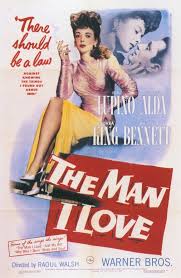
THE MAN I LOVE
US, 1946, 76 minutes, Black and white.
Ida Lupino, Robert Alda, Andrea King, Martha Vickers, Bruce Bennett, Alan Hale, Dolores Moran.
Directed by Raoul Walsh.
The Man I Love is an entertaining star vehicle for Ida Lupino. She works with Robert Alda, popular at the time in such films as Rhapsody in Blue (as Gershwin) and The Beast With Five Fingers. There is a strong supporting cast including Bruce Bennett, Martha Vickers and Alan Hale. The usual Warner Bros. production values are evident with a score by Max Steiner and direction by veteran Raoul Walsh. Walsh had worked at Warner Bros for many years, directing a number of action features, westerns and war films. This is something of a change of pace.
1. An entertaining melodrama? Post-war setting? The focus on people trying to make good after the war? The world of nightclubs?
2. Production values: Warner Bros. black and white style, stars, locations, score? The use of songs (and the dubbing of Ida Lupino's voice)? The title and the title song?
3. The film focusing on Petey Brown? Ida Lupino's style? Away from home? Nightclub singing and the opening of the film? Her decision to return home? Presents? Arrival and her relationship with her sisters, Sally and Virginia? Her friendship with Gloria and Charlie? Life -in the apartments? Difficulties war injuries, hospitalisation? Financial difficulties? Her getting a job? Her contacts with Nicky Toresca? Nightclubs? Her standing her ground, clashing with him? Attracted towards him,? The complications at the nightclub? Financial complications? , The difficulties at home? her family turning against her? Her encounter with Sam Thomas? Her liking for him? Falling in love with him? Building him up? The resolution of problems at home? Setting out once again on her own life?
4. The presentation of Petey's sisters? Sally and her problems? Virginia? marriages? Nicky Toresca and his intervening, infatuations? The relationship Of the sisters to Petey? Depending on her, finance, moral support? Her resolving their problems? The family sequences, celebrations and joy? marriages?
5. Gloria and Charlie? Gloria as the goodtime girl? Her husband? The mix-up with Nicky Toresca? Violence and danger?
6. Nicky as the nightclub proprietor, suave man-about-town, attraction towards Pete, giving her a job? Matching wits? Infatuation with her sister? Disruptive influence? Petey standing up to him?
7. The contrast with Sam and his music skills, down and out? The support of Petey? In love?
8. The background of America in the immediate post-war years? Life returning to normal? The impact of the war? Veterans? Illness?
9. Popular melodramatic entertainment? The focus on characters, tensions in situations? Resolution of problems?
Published in Movie Reviews
Published in
Movie Reviews
Tagged under
Saturday, 18 September 2021 19:34
Manhunter
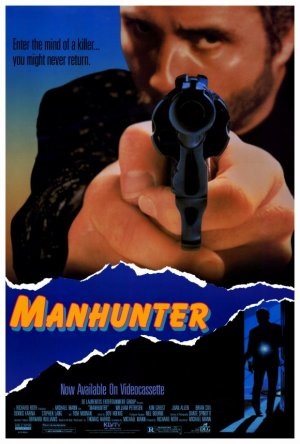
MANHUNTER
US, 1986, 119 minutes, Colour.
William Petersen, Joan Allen, Brian Cox, Kim Greist, Dennis Farina, Tom Noonan, Stephen Lang.
Directed by Michael Mann.
Manhunter sounds a routine title for a popular police thriller or television series. However, this is a crime story that is well above average.
Writer-director Michael Mann has made some offbeat films, The Jericho Mile, Thief, The Keep. But he is also the man behind the popular Miami Vice. He brings these skills together in Manhunter.
The focus is on a former FBI agent, played by William Peterson (To Live And Die In LA). He has suffered psychological trauma after tracking and catching a mad mass murderer. He is asked to track down another killer.
The film works well as a character study of one man trying to penetrate the insane behaviour of another. It is also an effective police thriller. However, it is particularly interesting as a detection story, evidence, connections, discoveries.
Production is excellent and opts-for stylish and stylised sets and colour schemes as well as a meditative and brooding mood as we share the Manhunter's quest. There are some grim and violent sequences.
Hannibal Lecter re-appeared in the form of Anthony Hopkins in The Silence of the Lambs, then Hannibal, then a remake of Manhunter under its original title, Red Dragon.
1. Impact of the film as thriller? Crime detection?
2. The importance of style: wide screen, colour, light and shadow; compositions? Moods? Pace and editing? The importance of the visuals and sounds for meanings? The musical score, themes, ominous mood?
3. Atlanta locations, the American city, homes, ordinary life? Police precincts? Laboratories? The various cities?
4. The title and its focus on Graham? The original title of the novel 'Red Dragon' and its relationship to the murderer?
5. Michael Mann and his style? Sense of brooding, study in character, environment and character? Madness? The insanity of mass murder? The meditative style?
6. The prologue and the build-up to the killings? The audience seeing with the murderer's eyes - as does Will Graham? The situations, the families and their deaths? The enquiry? Information about the murderer, monthly murders and the moon? The need for discovery in time?
7. The portrait of Will Graham? On the shore talking with the police, his wife and son, domestic life, sharing with his wife, asking his wife about going? His decision to investigate? His being briefed, relationship with the police? His techniques of enquiry? The burden because of his past trauma and recovery? Going to the prison to interview the doctor? Psychological sparring with the doctor? Trying to understand the mentality of the killer? His previous trauma by strict identification with the killer? H-is being photographed with the reporter? Clash? Later using the paper and the photographs with the journalist? Graham's skill at detection, information, his continuously examining the material? The insane doctor and his codes and message? The set-up with the trapping of the jogger? Going to the houses of the victims and trying to see with the killer's eyes, going up into the tree? Hunches, fingerprints on the eyes? Visiting the murder rooms and understanding? His contact with his wife, the effect of the threats? Her continued support? The effect of the past on the new investigation? The final clues, the photography lead? Detection, confrontation, the final stalking and shooting? The finale and his return home? Portrait of and intelligent, clever, vulnerable man? The risk, saving people? The impact of the investigation on him?
8. The murderer and the victims, audience sympathy, the puzzle, introducing the killer to the audience, his mystical and exotic beliefs, belief in himself, the paraphernalia in his apartment, the contact with the psychotic doctor, the codes and the communication, admiration? His taking the journalist, disguised with the stocking, the interrogation of the journalist, setting him on fire? His relationship with the blind woman, their sexual encounter, his jealousy? His plans for the next family? The use of video? The build-up and the encounter with the girl? The final confrontation and his death? Audiences understanding the mind of the killer? Madness and obsessions? Psychological explanation?
9. Graham's wife and son, bonds between them, safety and support?
10. The insane doctor, his past, the suave interview with Graham, revenge, the use of codes for contact with the killer, his skill in getting Graham's home address? The explanation of his crimes and psychology?
11. The sketch of the police, their work, detection, investigations, laboratories and details, meetings? The final flight and attack?
12. The journalist and his intervention-in the past, taking photos, self-seeking, the photo with Graham, being taken by the killer, his abject fear, death?
13. Portrait of American society, sick aspects of society, criminal mentality? The need for detection and police protection? The responsibility for sick society?
Published in Movie Reviews
Published in
Movie Reviews
Tagged under
Saturday, 18 September 2021 19:34
Make Mine Mink
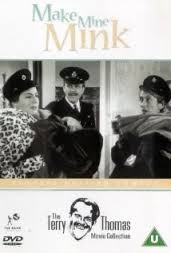
MAKE MINE MINK
UK, 1960, 97 minutes, Black and white.
Terry-Thomas?, Athene Seyler, Hattie Jacques, Billie Whitelaw, Raymond Huntley, Irene Handl, Sidney Tafler.
Directed by Robert Asher.
Make Mine Mink is one of those enjoyable zany comedies from Britain of the '50s and '60s. It is an opportunity for a wide-ranging cast to do their comic thing: Terry-Thomas? once again to be a Major with military-like precision, Athene Seyler to do her shrewd but doddery old lady, Hattie Jacques to do her overwhelming masculine spinster, Irene Handl to do an entertaining guest spot as a fashionable dress shop manager, Kenneth Williams to do his usual. There is also an enjoyable performance by Elisabeth Duxbury as the mouselike Miss Pinkerton. Contrasting with them are Billie Whitelaw and Jack Hedley as maid and policeman. Raymond Huntley looks in as a supercilious policeman. Noel Purcell has a moment as a stranded burglar. Sidney Tafler is a con-man with Joan Heal as his dominating wife and May Hallatt as his old mother. Mix this gallery together and there is a fair amount of humour - obvious verbal British jokes, a lot of visual humour with the robberies.
The film works humorously on the audience's delight in amoral moral behaviour. (A similar idea was used in the Australian feature Touch and Go with Wendy Hughes.)
1. Entertaining British comedy? British humour, verbal and visual?
2. Black and white photography, the editing and pace for the various robberies? jaunty musical score?
3. The title and its focus on the group, their robberies - and their devotion to charities?
4. The block of flats and the various guests: Dame Beatrice and her paying guests, her attitudes towards society, charity? Miss Pinkerton and her mouselike behaviour? Miss Parry and her militarist tic style? Major Rayne as the retired officer who longs for the war? Lily as the maid? A situation for comedy? The irony of Lily's acquiring the stole and giving ideas to the foursome? Their dissatisfaction with their lives, the desire for excitement? Major Payne returning the stole, with precision? The irony of Spanager and his mother and the return of the steal? Ideas for robberies? The planning sessions, each taking responsibility, Miss Pinkerton and her rehearsals and messing things up? The visit to Madame Spolinski's? The robbery of the furs? The disguises, the mistaken Identities, the thieves arguing their way out of difficult situations? Their being flushed with the success? Their fear of detection by Lily and Jim? Their getting rid of the furs? The visit of the police and their fears? Lily's discovery of the truth, their promises? The irony of Miss Parry losing her fur and Miss Pinkerton stealing it? The police visit about this - and their almost being unmasked? The decision to rob the gambling house? The plans, things going wrong, the police raid, the real police raid and the chase? Their decision to reform? Further appeals on charity? Their decision to rob the Crown Jewels?
5. Athene Seyler as the shrewd but dithering Dame Beatrice? Her command of the others? Lily and her background? Participation in the robberies? Her manner in the shop? Going to look for a fence - and discovering it was her nephew? The link with him? The gambling house and her winning- only to be thwarted by the raid?
6. Terry-Thomas's Major Payne, his manner and comic style, timing? The militaristic style? The return of the initial stole? The planning of the other robberies? The comedy when he went to look for the fence - only to find the cafe had changed hands to the Salvation Army? His worry, thinking of shooting himself, his being rescued by Miss Parry?
7. Miss Parry and Hattie Jacques' overbearing manly style? H6r disguises? Enjoyment of participating?
8. Miss Pinkerton and her fears, nervousness, drink? Her mixing up names? Mistakes? Taking Miss Parry's stole? Her final success in coming out of herself?
9. Lily and her past, working for the group, devotedness to Dame Bee? Attraction towards Jim, telling him the truth? Discovery of the truth about them and holding them to reform? Jim and his attentiveness, visits?
10. The police and their visit, the interrogation and the dithering, the irony that there was the mistaken identity of the fur?
11. The humour of the gallery: Madame Spolinski and her fashionable style, Her scatty assistant? Kenneth Williams' eye-rolling and speech mannerisms for the crooked Honourable Freddie? Raymond Huntley's supercilious style as the Inspector? The comedy with the Spanagers? With the burglar?
12. Visual and verbal humour? Playing with morality and immorality?
Published in Movie Reviews
Published in
Movie Reviews
Tagged under
Saturday, 18 September 2021 19:34
Magic Bow, The

THE MAGIC BOW
UK, 1946, 106 minutes, Black and white.
Stewart Granger, Jean Kent, Phyllis Calvert, Dennis Price, Cecil Parker, Felix Aylmer, Frank Cellier, Marie Lohr.
Directed by Bernard Knowles.
The Magic Bow is one of the many Gainsborough period features of the mid-40s. The stars, Stewart Granger, James Mason, Phyllis Calvert, Margaret Lockwood, Patricia Roc, alternated their roles in these various melodramas, including The Man in Grey, Fanny By Gaslight.
This is a popular version of the life and career of Nicolo Paganini. Stewart Granger is suave and moody as the violinist. The violin is played by Yehudi Menuhin. Phyllis Calvert is charming as Jeanne. The supporting cast includes Cecil Parker as the lawyer who befriends Paganini and Jean Kent as a rival for his love.
The film re-creates 19th century Italy with sumptuous style in black and white photography. However, the film is merely an outline of Paganini's life, Reader's Digest style. In its melodrama, it has the touch of the exaggerated and humorous rather than the serious drama.
However, it is entertaining in its way, has a competent cast - and, of course, boasts Yehudi Menuhin playing Paganini, Mozart and Beethoven.
1. An enjoyable biography? Period film? The slight plot? the score?
2. The strength of the black and white photography, sets and decor, costumes? The importance of the score: Paganini, Mozart, Beethoven? Yehudi Menuhin's skill?
3. Audience response to Paganini: his situation, skills, compositions, reputation? An introduction to Paganini? Stewart Granger's characterisation?
4. Paganini in his family, poverty, his parents? In Genoa and his feelings stifled? Relationship with Bianchi? Jeanne and her employing him for her father's escape? Playing his variations? The derision to go to Palma? His playing and the encounter with Germi? The contest for the Stradivarius violin, his playing the composition? The concert and his reaction to Palma's society, walking out? Boarding, the landlady? Gambling and the pawning of his violin? Jeanne and her getting it back? Germi's support? In love with Jeanne? The occupation of the city by Napoleon's troops, the encounter with Paul? Loss of Jeanne, his fear of his own abilities? The invitation to the Vatican? Jeanne’s response, his success?
5. Jeanne and her hiring of Paganini, attracted to him, the concert, her parents, the planned marriage, her devotion to Paul, separation from Paganini, the concert, getting back his violin? Her declaration to Paul, love for Paganini?
6. Bianchi, her watching Paganini, in love with him, ignored by him, her singing at the concert, following him to Palma?
7. Germi and his eccentricities, the lawyer, not having any money, boarding with Paganini, devices for the landlady, for the concert, getting the violin back?
8. The 19th century world, poverty, society, Napoleon and the ward, imprisonment, the Vatican and the papal concert?
9. The music of Paganini? In his time? In later centuries?
Published in Movie Reviews
Published in
Movie Reviews
Tagged under
Saturday, 18 September 2021 19:34
Madness of the Heart
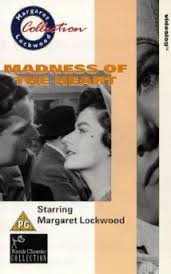
MADNESS OF THE HEART
UK, 1944, 1949, Black and white.
Margaret Lockwood, Maxwell Reed, Kathleen Byron, Paul Dupuis, Thora Hird, Raymond Lovell, Maurice Denham, Cathleen Nesbitt.
Directed by Charles Bennett.
Madness of the Heart is one of the many British melodramas of the '40s and '50s which highlight relationships, tragedy, high melodrama. Margaret Lockwood was the star of many of these films. Here she is a career woman who becomes blind, marries a charming Frenchman and goes to his home in France only to meet the hostility of the family and, especially, the hostility of the woman who wanted to marry him. The film is reminiscent of Rebecca - and Kathleen Byron does an excellent job as Verity (ironic name), the charming but scheming villainess. She had appeared to this effect in such films as Black Narcissus, Prelude to Fame.
The film asks a lot of the audience as regards credibility - however, it is in the vein of the paperback romantic melodramas and is enjoyable as such. There is a strong supporting British cast.
1. The popularity of this kind of romantic melodrama? The similarities with Rebecca and other similar stories?
2. British production values: black and white photography, English and French settings? dramatic effect? The strong cast?
3. The melodramatic score? Pace, editing for melodrama?
4. The title and its relationship to Lydia? To Paul? To Verity?
5. The audience identifying with Lydia and experiencing the melodrama with her? The opening with Lydia as a nun, the portrait of convent life, the sympathetic superiors, her being advised to leave the convent - her false vocation, her falling in love, her disappointment, her going blind? The insertion of the flashbacks to explain this situation? Lydia as a career woman, her friendship with Simon? The encounter with Paul at the airport? The later meeting, falling in love? Her experience of blindness, the possibility of an operation? Her remaining blind? Her leaving the convent? Her going back to work, her cheerfulness, courage? Simon's arranging for Paul to meet her? Their love, marriage, going to France, the hostility of the family - especially the father and his resentment of her handicap? The hostile treatment by the family - the trouble with the children, Lydia's place in the household? The friendship with Verity? The encounters with the chauffeur Max? Paul's absence, her fears and suspicions? her having to cope? The friendship with Verity, Verity's confidences? The attempts on her life - the window, the drowning, the framing of the letter and making it sound suspicious? Verity's not posting it? Paul's hostility? Her leaving the house? The chance operation, its success? Meeting Paul again at the airport - her return, the unmasking of Verity? The reconciliation? A true melodramatic romantic heroine?
6. Paul as the charming Frenchman? The encounter with Lydia, marriage, his business, family, suspicions? His grief at Lydia's leaving? The happy reunion? The sketch of the members of his family – except the hostility of his father?
7. Verity as villainess - her wanting to marry Paul, her seeming charm, riding with Paul, attempts to make Lydia jealous, attempts on her life - the window, the swimming and the drowning and her pretending to save her, her not posting the letter? Her collusion with Max, Max and his suave but sinister blackmail? Lydia returning and unmasking Verity? The crash and the melodrama death of Verity and Sax?
8. Audience suspension of disbelief for enjoying this kind of contrived and heightened romantic melodrama? British style?
Published in Movie Reviews
Published in
Movie Reviews
Tagged under
Saturday, 18 September 2021 19:34
Madison Avenue
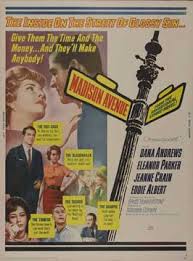
MADISON AVENUE
US, 1961, 94 minutes, Black and white.
Dana Andrews, Jeanne Crain, Eleanor Parker, Eddie Albert, Howard St. John, Henry Daniell, Kathleen Freeman.
Directed by Bruce Humberstone.
Madison Avenue is one of those adaptations of big books about society and business that were so popular at 20th Century Fox in the late '50s and early '60s, from Peyton Place to From The Terrace to The Best of Everything. This is a lower-key version of that genre. Filmed in black and white, directed by veteran Bruce Humberstone, the film has popular 20th Century Fox stars doing their thing: Dana Andrews, Jeanne Crain, Eleanor Parker.
The film focuses on the world of advertising, advertising agencies and their battles with one another to get accounts. The film shows Madison Avenue as an advertising jungle. Dana Andrews is the agent with ideas, Jeanne Crain is the journalist, Eleanor Parker is the prim secretary who is transformed into a workaholic executive.
While the material is larger than life and expected to be taken as such, the film shows in the grand style aspects of what it is to be involved in the rat-race of the business world. This is the stuff of later television series and mini-series.
1. The appeal of this kind of material? Highly blown soap opera materia1? Perennially entertaining?
2. Black and white photography, Cinemascope? The world of advertising and Madison Avenue? Offices and executive suites? and public shows? The musical score?
3. Bars? Firms? Madison Avenue and its reputation? The centre of the advertising and business world?
4. The title of the original novel was The Build-Up?. Differences in focus?
5. The film focusing on Clint Lorimer: his brilliant work, his ambitions, his work as an executive, the dairy concern account, his hopes of going out on his own, the pressures from Jocelyn, the attack on Clint's dealings with Jocelyn, reputation and the deal, his losing out? and the members of the executive? His decision to get revenge? Getting the account? The subsidiary firm? His relationship with Peggy, his failing her often? Her wanting to help him? His contact with Anne Tremayne, her dowdiness, her work in advertising, the small dairy account, Clint's advice to her and transforming her? His friendship with Harvey Ames, the president of the subsidiary? His becoming powerful? The advertising campaigns? Harvey Ames' speeches? The satiric presentation of Clint's success? Peggy’s reaction against him, her expose? The irony of her going to work with Jocelyn? Anne and her love for Clint, her disillusionment with him? The irony of her taking his job? Clint down and out? The discovery of one of his old projects, his trying to put it into practice, his getting back to work with Jocelyn, Peggy giving him another chance? world of Madison Avenue?
6. Peggy Shannon and her work as a journalist, her meeting Clint in the bar, her taking a stand against him, his winning her over? Her response to his new job? His letting her go? Her reaction against him writing the expose? The irony of Jocelyn's interest? Getting a job? Her being persuaded to forgive Clint?
7. Anne Tremayne and her work with the firm, her dowdy style, the impact of Clint, his wanting to help her, his transforming her and the effect on her, her falling in love with him, his ignoring her, her throwing herself into her work, ousting him from his job?
8. Harvey Arries and his breeziness, his work, his being caught up in Clint's impetus, the meetings, the speeches, the success? The reality and the phoniness?
9. Jocelyn and his toughness, ruthlessness with Clint, promotions and sackings? The fights in the advertising world? Industrial espionage with files? Using financial organisations to win accounts and steal them? The irony of his welcoming Peggy? Welcoming back Clint? The sketch of other executives - in their iciness and ruthlessness?
10. Audiences believing this to be the real advertising world? Is it?
Published in Movie Reviews
Published in
Movie Reviews
Tagged under
Saturday, 18 September 2021 19:34
Murder in Three Acts
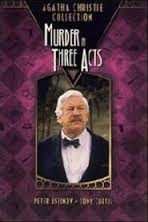
MURDER IN THREE ACTS
US, 1986, 94 minutes, Colour.
Peter Ustinov, Tony Curtis, Emma Samms, Jonathan Cecil, Lisa Eichhorn, Diana Muldaur.
Directed by Gary Nelson.
Murder in Three Acts is an entertaining Agatha Christie story with Peter Ustinov once again portraying Hercule Poirot. He did so in the cinema films; Death on the Nile, Evil Under the Sun, as well as the telemovies Thirteen at Dinner and Dead Man’s Folly. He obviously relishes the role. Jonathan Cecil repeats his performance as the rather engagingly dithering Colonel Hastings. The co-stars include Tony Curtis as an actor, Emma Sams from TV as a young girl interested in solving the murder. Guest stars include Diana Muldaur, Lisa Eichhorn, Dana Elcar.
The film has Acapulco settings which make it quite attractive to look at. The mystery is not too difficult to penetrate - but is enjoyable in showing how Poirot works it all out, as usual.
1. Entertaining Telemovie? Agatha Christie story? Poirot's story?
2. Acapulco settings, the affluent world of Mexico tourists? Musical Score?
3. The title, the focus on theatre, the actors and actresses, the dress rehearsal?
4. Audience enjoyment of peter Ustinov as Poirot, the previous films, the updated Belgian detective in the Agatha Christie vein? His personal vanity and idiosyncrasies? Friendship with Hastings? Going to Mexico, the dinner, the death? His scepticism, taking the glass? The lack of evidence? His return to Los Angeles, writing his memoirs with great difficulty? The visit of Charles Cartwright, the second death? His
return to Acapulco, the investigations? Suspicions of the various characters? Interaction with thein? The build-up to the meal and Charles acting the death - and people's reactions? The visit to the sanatorium? Mrs Rush-Bridger? The inside of the dress rehearsal? Everybody Joining for the final explanations and confrontation? Writing his memoirs - and the amusing ending with the thought that he might have been murdered?
5. Hastings, the proper Englishman, Poirot having him around, enjoying the company? in Mexico, naive, friendly with Poirot, guiding Taking notes, assisting in the investigation?
6. Charles Cartwright, the Tony Curtis style glamorous actor, reputation, retirement? Hosting the meal, the first death and his reaction? Leaving Acapulco? His coming to Poirot in Los Angeles? The return and the investigation, his participation? The confrontation - and the background of his murder, his madness and violence? The dress rehearsal? The impersonation of the butler, of the old groundsman? His final speech about sanity and madness? His being taken off?
7. The various suspects: Egg and her youthful enthusiasm, crashing into Poirot, suspecting the murder, friendship with Ricardo? Her mother? Her joining in the investigations, especially with Daton? Daisy Eastman, relationship with Egg, suspicious, going to the dress shop and interviewing Cynthia Daton? Janet Crisp and her non de plume, her plays? Her being curious, suspicious, dropping the coffee cup? Angela and the Broadway background, her presence, disdain for Egg? The Daton's and his alcoholism, her running the dress shop, the tension between the two, their being questioned? Ricardo and his friendship with Egg, the pretended drama of the car breaking down?
8. The victims - the Rev Babington, his early death, his wife? Dr Strange, friendship with Charles, his physician, the neurologist? Inviting everybody to the dinner, the joke about the butler? The phone call?
9. Colonel Murtoa, the investigations? Going to the sanatorium? The secret passage. Rosa and her boyfriend, giving the information? The people at the nearby restaurant -and their evasive answers?
10. The popularity of this kind of murder story, the clues and plane fare, audiences working out the mystery, hearing Poirot's solution?
Published in Movie Reviews
Published in
Movie Reviews
Tagged under
Saturday, 18 September 2021 19:34
Mr Winkle Goes to War
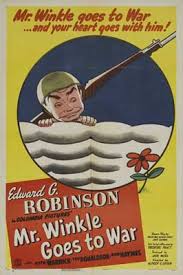
MR WINKLE GOES TO WAR
US, 1944, 80 minutes, Black and white.
Edward G. Robinson, Ruth Warrick, Ted Donaldson, Robert Armstrong.
Directed by Alfred E. Green.
Mr Winkle Goes to War is a short 1942 feature, entertainment and propaganda. It was directed by Alfred E Green who was to direct many films at Columbia, including the Jolson Films.
The film is a star vehicle for Edward G Robinson who, nearing 50, had been goodies and gangsters in the 30s. Here he's the genial little man, the banker who is timid, who wants to work with his hands, who has an ambitious wife, a young friend with whom he can work who is called up and finds a new life in the army, its brotherhood, its activities - who then becomes a war hero.
There are some patriotic speeches as well as attacks on Japanese in the spirit of the times. However, Edward G Robinson makes it highly enjoyable and still makes the film watchable. Ted Donaldson, one of the child stars of the time, is Barry. Ruth Warrick is Mr Winkle's wife.
1. Entertaining human drama? War propaganda? The propaganda aspects in their time? Now?
2. B. Budget production, black and white photography, the American town, barracks and camp, military training, action sequences?
3. The title, the focus on Edward G Robinson as the little man, Wilbert Winkle and the humour of his name? The timid bank manager? His going to war, being transformed, becoming a hero and being acclaimed in the media? The irony of the title and yet its strong propaganda effect?
4. Edward G Robinson as Mr Winkle, the little timid man, his age, experience in the bank, the drama Of his resignation, going home, the confrontation with his wife and her concern about what people will think, his friendship with Barry, the tools and the setting up of the shop? His wife's antagonism, covering up? His work in the shop, not being allowed back home? The call-up? Going, the examination, his poor physical health and his tablets? His being taken? Going with the Sergeant and the rest of the group, timid, the food and his tablets? His being assigned to accounts? Going to the dance and continually interrupting, in Jail? His plea to work with his hands? Mechanics, his skills, the hard training, giving away the pills, sleeping well, exercise, eating? Growing friendships? The night out with the girls - and his timid approach? Relief in going into action? His staying even though overage? Friendship with the rest of the group? Their singing together? In action, the bulldozer and his attack on the Japanese, unconscious? The hero? The return home, avoiding the crowds, meeting Amy, Barry wanting him to show him the shop? The mayor and speech? His going into the shop - and Amy having helped with making the gate? The happy ending? The propaganda purposes - the timid little elderly man could become an American hero?
5. Barry, the orphan, devotion to Mr Winkle, working in the shop, the gate? Devoted to Mr Winkle - not wanting him to go? The letter about his working in the office? The guns? With the rest of the boys? Mr Winkle going to war, his hitch-hiking, telling the truth to Amy? The happy ending?
6. Amy, concern about the neighbours and status? Alienating herself from Mr Winkle? The call-up letter? Advice from relatives and friends? The hitch-hiking, Barry telling her the truth? Receiving him at home, her ambiguous stance - but relenting and making the gate to the shop?
7. The sergeant, his relationship with the men, with Mr Winkle, at the dance, the bonds? The various members of the group, training together? solidarity within the army?
8. Training sequences and their toll on Mr Winkle, transforming him? The war scenes, the confrontation with the Japanese and the man avenging his brother's death? Heroism?
9. Popular little story - holding up well after the decades, despite the overt propaganda?
Published in Movie Reviews
Published in
Movie Reviews
Tagged under
Saturday, 18 September 2021 19:34
Mr Moto's Gamble

MR MOTO'S GAMBLE
US, 1938, 60 minutes, Black and white.
Peter Lorre, Keye Luke, Lynn Bari.
Directed by James Tinling.
Mr Moto's Gamble is one of the series of Mr Moto's stories starring Peter Lorre. Originally, this film was intended to be a Charlie Chan film but the star, Warner Oland, died. (However, his number one son appears as a character in this film.) The film is boxing and gambling story, Mr. Moto trains would be detectives - and there is some comedy with a kleptomaniac who want to reform by becoming a detective and Charlie Chan's son. There is also the world of prize fighting, gambling and fixing matches. Nothing particularly startling - would be part of a series or a T.V. series in later decades.
1. Entertaining thriller? Murder mystery? The popularity of Peter Lorre as Mr Moto?
2. Big budget production? The cast? The length?
3. The title, the focus on Mr Moto and audience familiarity with him? The world of boxing and gambling?
4. Peter Lorre as Mr Moto, engaging, his school, the kleptomaniac and his activities (broadening to the solution of the film)? Charlie Chan's son? Martial Arts? His going to the boxing matches, observations, interrogations? His setting a trap for the murderer?
5. The world of boxing, the fighters themselves and their girl friends? The trainers? The promoters? The gambling and fixing?
6. The usual gallery of suspects - those who bet, the trainers, the fighters themselves? The murders?
7. The mystery Mr Howard, the bets, the killings, his death? Mr Moto and his suspicions - setting the trap with the gun, the murderer and the threat to his daughter?
8. The world of sport, girlfriends, rivalries, the world of humour? A satisfactory combination for this kind of 40s thriller?
Published in Movie Reviews
Published in
Movie Reviews
Tagged under
Saturday, 18 September 2021 19:34
Movers and Shakers
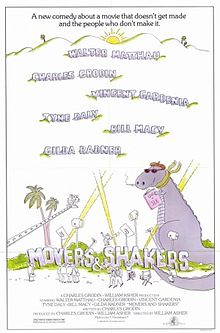
MOVERS AND SHAKERS
US, 1985, 80 minutes, Colour.
Walter Matthau, Charles Grodin, Vincent Gardenia, Bill Macy, Tyne Daly, Gilda Radner, Steve Martin.
Directed by William Asher.
Movers and Shakers is a brief, mild comedy about Hollywood and movie making. It was written by Charles Grodin (who had also written 11 Harrowhouse). There is a long discussion of the difficulties in getting the film made by Grodin in his autobiography. However, the finished product does not seem to merit so much concern. The humour and satire is mild.
The film shows the running of a studio, the studio hacks from Chairman of the board to the yes men who follow the head of the studio. There are mad ideas - including a model dinosaur solemnly enthroned in the studio grounds. There is the buying for a million dollars of the title of a book, Love in Sex and it is the attempts to turn this into a family movie, a tribute to love, that the film concerns itself with. Walter Matthau is his usual self as the harassed head of studio. Grodin is his
laid back, nonchalant but comic self as the would-be writer. Bill Macy plays a frantic director. There is a strong supporting cast including Tyne Daley and Gilda Radner as the wives and an exotic cameo guest performance by Steve Martin as a self-conscious Italian star with Penny Marshall as his girlfriend. There are plenty of knocks at Hollywood - but they have been done before, and better.
1. Enjoyable comedy? Hollywood, movie making? Parody?
2. Hollywood locations, the studios, beach homes, the beach? Authentic? Musical score, songs?
3. The titles and the reference to Hollywood movie makers, creative people, hacks? And not getting things achieved?
4. Audience knowledge of Hollywood, film making? Appreciating the behind the scenes work? Saul and his eccentric ideas, his dying wishes, the dinosaur, the failure of that production, the buying of the title Love in Sex? The heritage for Joe as head of the studio, fulfilling his friend's wishes? The attitude of the chairman of the board, to the statue, to its removal, to Love in Sex, the press?
5. Joe Mulholland, head of the studio, a Walter Matthau character? The dinosaur and his speech at its setting up? His visits to Saul, Saul's bequest? His assistants and their following him, the meetings, yes men, eccentric ideas? The vague concepts? Hollywood's brightest minds! his wanting Herb to write the screenplay? Getting him to the meeting, the suggestions, Herb's hesitations? The fatuous remarks? The planning, the writing? The visit to the Italian star and his performance? The parties, the conferences? Getting nowhere? The possibility of an X rated film? The interviews and the publicity, Joe denying them? The removal of the dinosaur? Joe's collapse? Hospital? Discussions with Herb? The failure of the film? A well-meaninged man -but ineffectual?
6. Herb, his background, a Charles Grodin character? Slow writing, the visit to the studio, his hopes? The importance of the voice over and his perspective on things?
7. Herb and his relationship with his wife, her ignoring him? His attitude towards a tribute to romance? At the meetings, writers block, walking along the beach? The coldness of his wife? The episode with Syd and the writing, going along to all the cliches locations of the romantic story - from beach to rollercoaster? Syd and his relationship with his girlfriend, the marriage, their shooting each other on the honeymoon? The visit to the Italian star? The slow meetings, Dorothy at the meetings and her looking at him? The sexy suggestions? Going home, desperate, being swayed back and forth? Communication with his wife, the reconciliation? Joe's collapse visiting him in hospital, letting the project go?
8. Syd, his verve, suspicions of his girlfriend and following her, the lover? The violence? Trying to persuade Herb, taking him on a tour of Los Angeles, the locations for the Film? Proposal, the marriage, the honeymoon and the shooting? The girlfriend and her strong character, dominating him and telling him what to do?
9. The studio bosses, the old and their fatuous ideas? the young and their ambitions, sexy ideas and advertising? The humour of sizes of drinks at meetings etc?
10. Steve Martin as the eccentric Italian star, his manner, parody? His girlfriend?
11. The world of Hollywood, creativity or not? Business deals? Giving the people what they want? The executives out of touch? Sending up their closed world?
Published in Movie Reviews
Published in
Movie Reviews
Tagged under